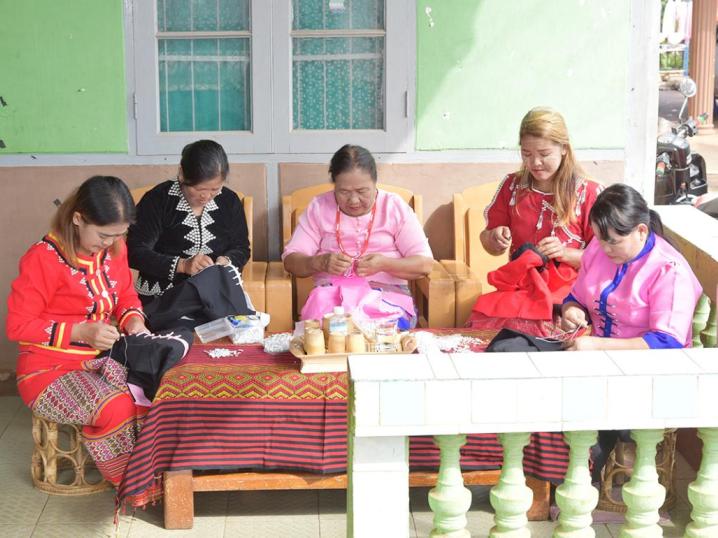Traditional with a Modern Twist Makes Good Business Sense

On a bustling street in Lashio township, Myanmar, the “Rose Family” shop displays the colourful and unique clothing designs of entrepreneurial couple, Kyaw Lin Aung (34) and Rose Htwe Su Maung (32). Located in the mountainous northern region of Shan State, along the border with China, Lashio is home to the Wa people, who have beautiful traditions and clothing, little known outside the Wa community.
“When I moved to Lashio, my wife’s native town, I saw many traditional clothing shops,” Kyaw Lin recalls. He was drawn to the colourful fabrics, but noticed that unlike the modernising of traditional styles he had seen in his native Mandalay, the shops in Lashio only offered traditional style Wa clothing. “I got the idea to make western style clothing with the traditional Wa cloth. That’s why we started this business.”
Before they were married, Kyaw Lin worked in his aunt’s Batik fabric shop in the main market of Mandalay, supplying the entire region with the special Indonesian fabric. In Lashio, Rose had opened a small sewing accessories shop. When they married, their common experience of supplying tailors and an interest in fashion led them to dream of building a fashion business together. They built up the small haberdashery shop that Rose had started, working hard to expand. Although they poured all their profits back into the shop, they found they were still struggling to finance their many creative ideas to expand the business.
It was a friend who told them about VisionFund’s loans for small business people and they ended up attending a training at the VisionFund branch on how to use a loan to effectively grow their business. In 2017, they received their first loan of 1,200,000 MMK (US$677) which they used to add new inventory to their shop. They quickly sold the inventory and repaid the loan. Then they took out a second loan of 2,000,000 MMK (US$1,128) which they used to purchase a garment fusing press machine, enabling them to provide new services to the local tailors. However, they still aspired to bigger dreams – and their biggest dream involved designing new clothing that fused modern design and traditional Wa textiles. To help achieve this goal, their loan officer recommended the “small and growing business” (SGB) loan, which is designed especially for entrepreneurs whose business is outgrowing typical microfinance loans.
Their first SGB loan of 6,000,000 MMK (US$3,375) in 2019 allowed them to design, manufacture and sell the first of their very own fashions. “Wa men’s traditional vests don’t look like western vests,” Kyaw Lin explains. “So we created a new design by combining the western style with the traditional Wa cloth. Then, for a wedding dress, we made a Burmese wedding dress with Wa designed cloth. Customers hadn’t seen these kinds of design before we made them.” The new designs were a hit, and sales quickly began to rise. They added staff to their shop to keep up, but then realised they were overwhelming their hand-woven textile suppliers. The solution they discovered was to pay the weavers in advance which enabled them to purchase enough raw materials to work more quickly, as well as giving preference to their orders. A second SGB loan was taken out to prepay for the materials needed to keep up with the demand.
When COVID-19 reached Lashio in 2020, new challenges quickly emerged. Firstly, the festivals and events which drive the demand for their main products almost ground to a halt. It required a change in direction and so the ever-resourceful entrepreneurs quickly adapted their products to include fashion accessories such as purses, bags, backpacks and household products like bedsheets, towels, tablecloths, all using the traditional, hand-woven Wa textiles. The new products once again proved to be popular but the pandemic made it difficult to sell in-person to their customers. The solution was to shift to online shops and live sales on social media. This not only made up for lost in-person sales, but also expanded their sales into nearby China. “After we do online live sales, we are busy for the next three days just sending out the orders,” Kyaw Lin says proudly.
The couple credits the business coaching provided with their SGB loans with helping them to adapt to the many challenges of rapid growth, as well the multiple crises they have had to face. They especially appreciate the network that the coaching provides. “We get the chance to learn from the experiences, journeys, achievements, and struggles of other small business people who we don’t know,” Kyaw Lin explains. “We can do peer-learning with each other, especially how we are struggling during the crisis time.”
Today, the shop is thriving despite the ongoing crises. They have seen revenues rise from about 500,000 MMK (US$282) per week in the early days of the shop to about 5,000,000 MMK per week (US$2,821) today, and they have now hired three full-time employees. They have also contracted six seamstresses to keep up with the demand, and have recently taken a third SGB loan to expand into wedding dresses. Their four-year-old son has also “joined” the business recently by modelling his parent’s fashions for their advertisements.
They are proud of their flourishing business as well as the impact they are having on their community. “The profits support my family and the employees’ incomes support their families,” says Kyaw Lin. Their family has also taken in five children from the Wa village of MongYun where armed groups have made life unsafe for children.
They are also proud of their work to promote and modernise the beautiful Wa traditional clothing. “We want to create new fashion designs without losing the essence of Wa tradition,” Kyaw Lin explains. “Our customers thank us for promoting their traditional costumes and our designs are becoming very popular, especially for weddings and social events.”